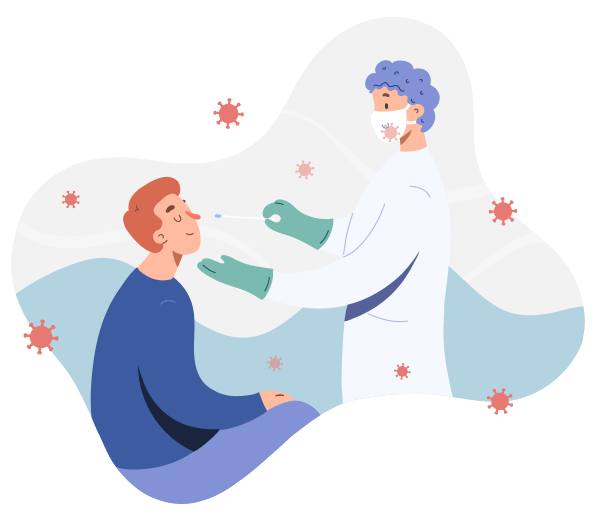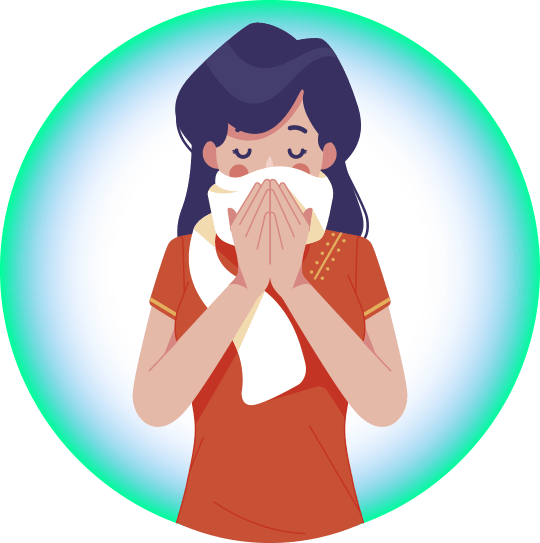



Coronaviruses are type of virus. There are many different kinds, & some cause disease newly identified type has caused recent outbreak of respiratory ilnessnow called COVID-19 that started in China.
Testing and screening are the most effective techniques to control the spread of deadly Covid-19 infection. It helps identify all those infected individuals who can spread the disease further by transmission.


How can you keep everyone safe at home while caring for yourself or a loved one? Who needs to be looked for at home? How can other family members be protected from COVID-19 infection?
Here’s what you should do and what you should avoid




United Clinical Lab offers the key three FDA-approved diagnostic COVID-19 tests.


Polymerase Chain Reaction (PCR) testing analyzes the upper respiratory specimen and looks for genetic material (ribonucleic acid or RNA) of SARS-CoV-2, the virus that causes COVID-19. RNA is discernible in the early phase of infection ––before the body has had a chance to manufacture antibodies to the infection.

Antigen tests are very successful in identifying cases where people are at their peak of infection. They are taken with a nasal or throat swab and detect a protein part of the Coronavirus. These tests are less expensive and generally faster but also less accurate. They can also identify if a patient had contracted the virus in the past.

Antibody testing screens antibodies in the blood. Antibodies are created when the body is fighting an infection like COVID-19. The antibody testing is not checking for the virus; it is looking to see whether the immune system has responded to the infection.

Read our FAQs to get deeper knowledge about Clinical toxicology testing services.
Everyone can get the rapid testing COVID at Chicago through UC Lab.
There are a lot of testing labs available in the city that provides COVID-19 test facility to people. Visit our nearest branch or call us to get same-day results of COVID testing in Chicago.
It depends on your health condition and vaccination. If you are not fully vaccinated, you have to get tested more often, even with no symptoms.
RT-PCR
Antibody
LFTs
At-home testing provides a facility to stay at home and provide the sample for testing sent to the lab, and the patient gets results in a few days.
Depending on your health condition and symptoms, your doctor can help you know which test is suitable for you.
A technician will take a small amount of your blood via a finger prick. SARS-CoV-2, the virus that causes COVID-19, is tested for one or both types of antibodies.
Early in infection, IgM antibodies are produced.
Antibodies of the type IgG are more likely to appear later.
A negative result indicates that you most likely didn’t have COVID.
A diagnostic test, often known as a “viral test,” looks for evidence that you’re infected right now. An antibody test, also known as the “serology test,” can reveal if you’ve been infected with the virus or have been vaccinated against it.
A false positive is an incorrect test result, indicating that the individual is infected when they are not or that they have antibodies when they do not.
Because SARS-CoV-2 is a respiratory virus, rapid antigen testing requires the patient’s respiratory specimens (usually a nasopharyngeal or nasal swab). After being collected, samples are put in an extraction buffer or reagent and analyzed for antigens unique to SARS-CoV-2.
Antibody testing uses blood samples as the specimen type. Antibodies to SARS-CoV-2 are combined with the patient’s blood, and if antibodies to SARS-CoV-2 are present, the two will bind to one other, resulting in a color shift that indicates the test is positive.
It’s crucial to note that this test only checks for the presence of antibodies generated in response to SARS-CoV-2 infection, not for the virus itself. As a result, it does not show whether or not someone is currently infected.
A positive result means that you are suffering from COVID-19, and you must keep your distance from others and isolate your self and take good care of yourself.
A negative result means that you are most likely not suffering from COVID-19, but still, you must keep your distance from others, and if you have any symptoms, you must be more careful. Sometimes you are suffering from the virus, but tests don’t detect it. from others and isolate your self and take good care of yourself.
Even if you are vaccinated for COVID-19, you can still get positive test results from your recent exposure.
Antibodies are the proteins produced by the body to help fight infections. They mostly protect us from getting the same infection again.
Antibodies are found in the blood of people who have been previously infected with or vaccinated against a disease-causing virus; they demonstrate the body’s efforts (past infection) or preparedness (past infection or vaccination) to fight the virus.
People who are fully recovered from COVID can get antibody tests.
A positive test result indicates that antibodies were found in your blood, indicating that you had COVID-19 in the past. It’s also possible that you didn’t have COVID-19 and the antibodies found were from a virus related to it. This is referred to as a false positive.
Yes, even if you have antibodies, you should get vaccinated to boost and strengthen your immune system.
No, your antibodies test result doesn’t decide whether you can go to work or not.
Yes, you can get tested for any reason.
Because SARS-CoV-2 is a respiratory virus, nucleic acid amplification testing necessitates the collection of respiratory samples from the patient. The most frequent method is to utilize nasopharyngeal swabs. Lower respiratory secretions such as sputum and bronchoalveolar lavage fluid are also utilized if a patient has pneumonia or a lung infection.
After that, the samples are processed and analyzed for SARS-CoV-2 RNA. Extraction of RNA from the patient material, conversion to DNA, and PCR amplification with SARS-CoV-2-specific primers are all part of the test.
2023 © Copyright UC - Labs All Rights reserved.